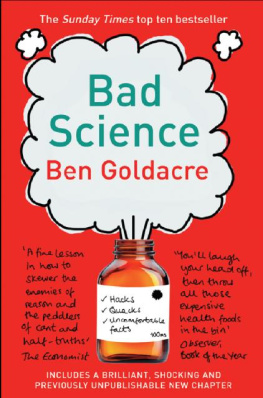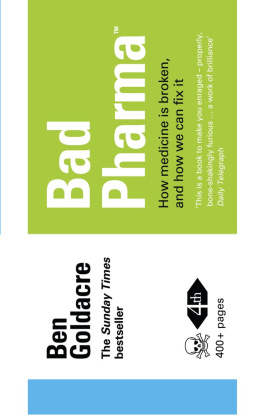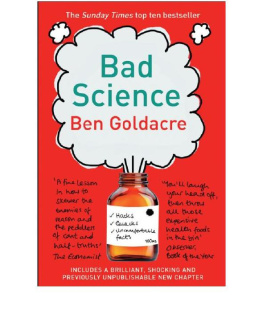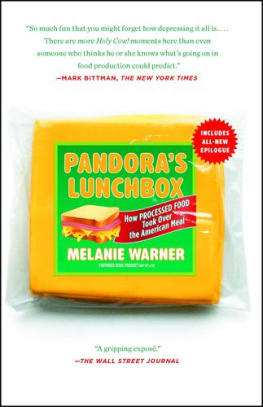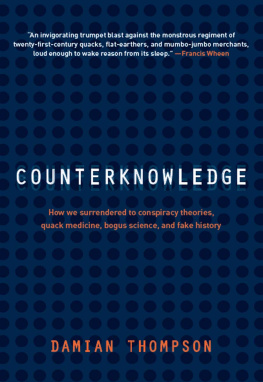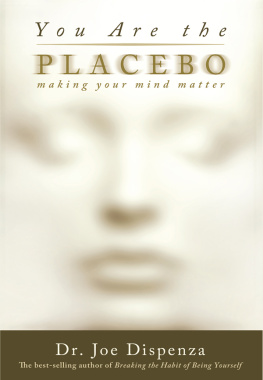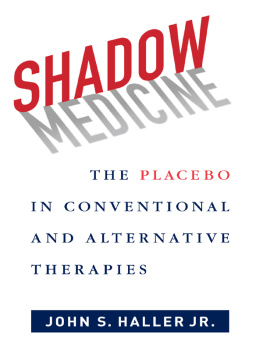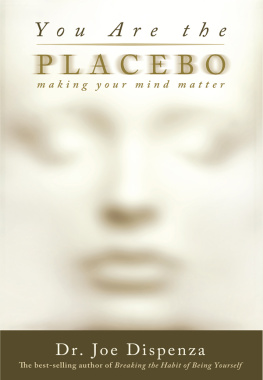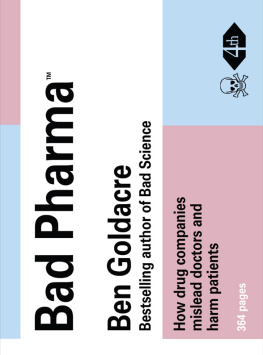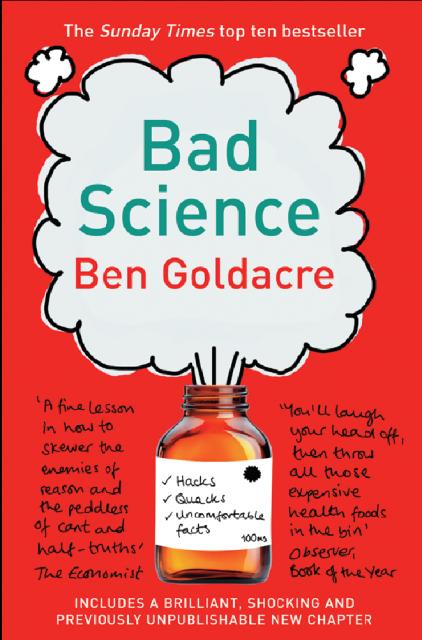Ben Goldacre
Bad Science
2008
Guardian columnist Dr Ben Goldacre takes us on a hilarious, invigorating and informative journey through the bad science were fed by the worst of the hacks and the quacks! When Dr Ben Goldacre saw someone on daytime TV dipping her feet in an Aqua Detox footbath, releasing her toxins into the water and turning it brown, he thought hed try the same at home. Like some kind of Johnny Ball cum Witchfinder General, using his girlfriends Barbie doll, he gently passed an electrical current through the warm salt water. It turned brown. In his words: before my very eyes, the worlds first Detox Barbie was sat, with her feet in a pool of brown sludge, purged of a weekends immorality. Dr Ben Goldacre is the author of the Bad Science column in the Guardian and his book is about all the bad science we are constantly bombarded with in the media and in advertising. At a time when science is used to prove everything and nothing, everyone has their own bad science momentsfrom the useless pie-chart on the back of cereal packets to the use of the word visibly in cosmetics ads.This book will help people to quantify their instinctsthat a lot of the so-called science which appears in the media and in advertising is just wrong or misleading. Satirical and amusingand unafraid to expose the ridiculousit provides the reader with the facts they need to differentiate the good from the bad. Full of spleen, this is a hilarious, invigorating and informative journey through the world of bad science.
INTRODUCTION
L et me tell you how bad things have become. Children are routinely being taughtby their own teachers, in thousands of British state schoolsthat if they wiggle their head up and down it will increase blood flow to the frontal lobes, thus improving concentration; that rubbing their fingers together in a special sciencey way will improve energy flow through the body; that there is no water in processed food; and that holding water on their tongue will hydrate the brain directly through the roof of the mouth, all as part of a special exercise programme called Brain Gym. We will devote some time to these beliefs and, more importantly, the buffoons in our education system who endorse them.
But this book is not a collection of trivial absurdities. It follows a natural crescendo, from the foolishness of quacks, via the credence they are given in the mainstream media, through the tricks of the 30 billion food supplements industry, the evils of the 300 billion pharmaceuticals industry, the tragedy of science reporting, and on to cases where people have wound up in prison, derided, or dead, simply through the poor understanding of statistics and evidence that pervades our society.
At the time of C.P. Snows famous lecture on the Two Cultures of science and the humanities half a century ago, arts graduates simply ignored us. Today, scientists and doctors find themselves outnumbered and outgunned by vast armies of individuals who feel entitled to pass judgement on matters of evidencean admirable aspirationwithout troubling themselves to obtain a basic understanding of the issues.
At school you were taught about chemicals in test tubes, equations to describe motion, and maybe something on photosynthesisabout which more laterbut in all likelihood you were taught nothing about death, risk, statistics, and the science of what will kill or cure you. The hole in our culture is gaping: evidence-based medicine, the ultimate applied science, contains some of the cleverest ideas from die past two centuries, it has saved millions of lives, but there has never once been a single exhibit on the subject in Londons Science Museum.
This is not for a lack of interest. We are obsessed with healthhalf of all science stories in the media are medicaland are repeatedly bombarded with sciencey-sounding claims and stories. But as you will see, we get our information from the very people who have repeatedly demonstrated themselves to be incapable of reading, interpreting and bearing reliable witness to the scientific evidence.
Before we get started, let me map out the territory.
Firsdy, we will look at what it means to do an experiment, to see the results with your own eyes, and judge whether they fit with a given theory, or whether an alternative is more compelling. You may find these early steps childish and patronisingthe examples are certainly refreshingly absurdbut they have all been promoted credulously and with great authority in the mainstream media. We will look at the attraction of sciencey-sounding stories about our bodies, and the confusion they can cause.
Then we will move on to homeopathy, not because its important or dangerousits notbut because it is the perfect model for teaching evidence-based medicine: homeopathy pills are, after all, empty little sugar pills which seem to work, and so they embody everything you need to know about fair tests of a treatment, and how we can be misled into thinking that any intervention is more effective than it really is. You will learn all there is to know about how to do a trial properly, and how to spot a bad one. Hiding in the background is the placebo effect, probably the most fascinating and misunderstood aspect of human healing, which goes far beyond a mere sugar pill: it is counterintuitive, it is strange, it is the true story of mind-body healing, and it is far more interesting than any made-up nonsense about therapeutic quantum energy patterns. We will review the evidence on its power, and you will draw your own conclusions.
Then we move on to the bigger fish. Nutritionists are alternative therapists, but have somehow managed to brand themselves as men and women of science. Their errors are much more interesting than those of the homeopaths, because they have a grain of real science to them, and that makes them not only more interesting, but also more dangerous, because the real threat from cranks is not that their customers might diethere is the odd case, although it seems crass to harp on about thembut that they systematically undermine the publics understanding of the very nature of evidence.
We will see the rhetorical sleights of hand and amateurish errors that have led to you being repeatedly misled about food and nutrition, and how this new industry acts as a distraction from the genuine lifestyle risk factors for ill health, as well as its more subtle but equally alarming impact on the way we see ourselves and our bodies, specifically in the widespread move to medicalise social and political problems, to conceive of them in a reductionist, biomedical framework, and peddle commodifiable solutions, particularly in the form of pills and faddish diets. I will show you evidence that a vanguard of startling wrongness is entering British universities, alongside genuine academic research into nutrition. This is also the section where you will find the nations favourite doctor, Gillian McKeith, PhD. Then we apply these same tools to proper medicine, and see the tricks used by the pharmaceutical industry to pull the wool over the eyes of doctors and patients.
Next we will examine how the media promote the public misunderstanding of science, their single-minded passion for pointless non-stories, and their basic misunderstandings of statistics and evidence, which illustrate the very core of why we do science: to prevent ourselves from being misled by our own atomised experiences and prejudices. Finally, in the part of the book I find most worrying, we will see how people in positions of great power, who should know better, still commit basic errors, with grave consequences; and we will see how the medias cynical distortion of evidence in two specific health scares reached dangerous and frankly grotesque extremes. Its your job to notice, as we go, how incredibly prevalent this stuff is, but also to think what you might do about it.

